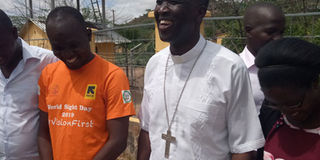Bishop Dominic Kimengich 'ready' to take over in Eldoret

Bishop Dominic Kimengich has a light moment with Turkana-based journalists after addressing them on his service at the Diocese of Lodwar, November 26, 2019. PHOTO | SAMMY LUTTA | NATION MEDIA GROUP
What you need to know:
- Bishop Dominic Kimengich is expected to formally take over at the Eldoret Diocese on February 1, 2020, succeeding Bishop Cornelius Korir who died in 2017.
- Speaking for the first time since his appointment, the 58-year-old addressed matters including politics, regional integration, bandit attacks, disarmament and peace.
- The clergyman said he will remain indebted to the people of Turkana who supported his transformation agenda while he was stationed there.
Newly appointed Eldoret Bishop Dominic Kimengich has said he is ready for the task following his appointment by Pope Francis on November 16.
Speaking on Tuesday, for the first time since his appointment, the 58-year-old addressed matters including politics, regional integration, bandit attacks, disarmament and peace.
However, the clergyman has mixed feelings given he will moved from the Lodwar Diocese.
He is expected to formally take over at the Eldoret Diocese on February 1, 2020, succeeding Bishop Cornelius Korir who died in 2017.
HISTORY
Bishop Kimengich attributed his mixed feelings to the bonds with many Christians and people of goodwill that he created while working in Turkana.
He worked in the area for nine years as the first African bishop of the Lodwar diocese.
His predecessor was John Christopher Mahon, who was ordained as the first bishop of Lodwar in 1978.
Bishop Mahon died in 2004 at the age of 82, four years after retiring. His remains lie at a monument next to St Augustine Cathedral in Lodwar.
Bishop Patrick Harrington later took over and served until he was replaced by the soft-spoken but straightforward Bishop Kimengich.
Bishop Kimengich said, "Since 1961, even before Kenya attained independence, the diocese was under Irish Missionaries of St Patrick Missionary Society. When I was picked to take charge as the first African Bishop, everybody thought it would be a big challenge for me."
BANDIT ATTACKS
The clergyman said he will remain indebted to the people of Turkana who supported his transformation agenda while he was stationed there.
He noted that he took over while the area faced deadly bandit attacks and cattle raids that caused border areas to be uninhabitable.
He focused on ensuring the church played a critical role in restoring peace.
Bishop Kimengich said that although banditry has not been eradicated, the vice is curbed through investment in schools, peace missions and evangelism.
"Together with all stakeholders, if we focused on education that changes the mind of the people and proclaimed the gospel which touches the heart of the people, our people would respond well to peace, education and development," he told journalists in Turkana.
PEACE
Regarding illegal guns, Mr Kimengich called for disarmament to ensure free movement of goods and pastoralists communities from Uganda, South Sudan and Ethiopia, that borders Turkana.
He noted that this will result in a conducive environment for development.
Bishop Kimengich has hosted his counterparts from Nakuru, Maralal and Kitale in Kenya; Moroto and Kotido in Uganda; Jima-Bonga and Dodo in Ethiopia; and Torit in South Sudan to an annual peace and evangelism conference in Lodwar. The meeting discusses regional peace.
Bishop Kimengich also spoke about infrastructure development, noting it has been a major contributor to poor enrolment and performance by Turkana schools.
He said that as the church advocated for education, they constructed 13 schools to add to the several Catholic-sponsored ones that missionaries started by missionaries and handed to the government.
The Church has also invested in health, human resources and boarding facilities in remote towns, at which field teams find shelter.
The bishop advised political leaders and development partners to shun corruption so that the billions Turkana received each year are used to improve the people's lives.





